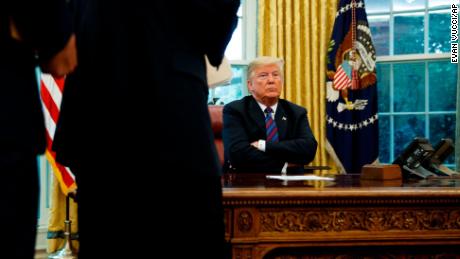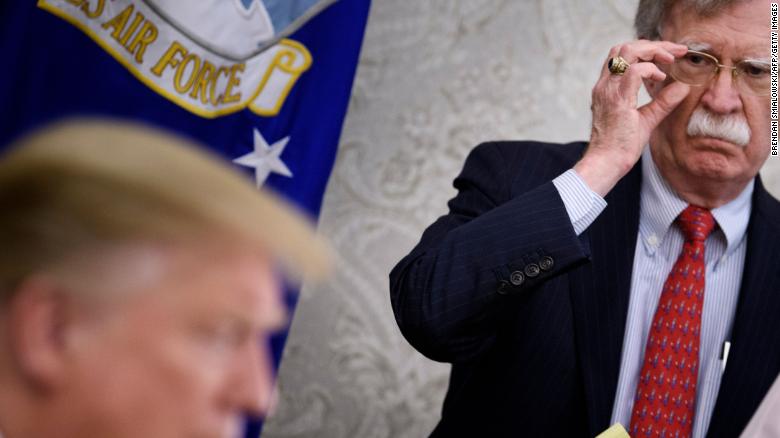Trump's Iran strikes U-turn underscores war and peace dilemma
President Donald Trump blinked.
By calling off US forces poised Thursday night to launch retaliatory strikes on Iran, Trump stepped back from the brink of a dangerous escalation in the standoff -- but raised a flurry of immediate questions about his performance as commander-in-chief.
"We were cocked & loaded to retaliate last night on 3 different sights when I asked, how many will die. 150 people, sir, was the answer from a General. 10 minutes before the strike I stopped it, not...proportionate to shooting down an unmanned drone. I am in no hurry," Trump tweeted Friday morning.
On the face of it, the last-minute pivot provokes the question of why he did not inquire about the human toll of the proposed attacks, that US officials said were on missile batteries and radars, before signing off on the mission to avenge the downing of the unmanned US aircraft.
By calling off the strikes, Trump was being true to himself -- and his desire to avoid being pulled into a new Middle East conflagration -- a principle that is at the core of his political beliefs and is central to his plan to win reelection in November 2020.
But all the same, his decision seems to reveal a chaotic and broken policy process on a matter of grave national security -- at a time when the Pentagon is rudderless without a permanent secretary of defense.
RELATED: Trump says US was 'cocked and loaded' to strike Iran before he pulled back
More broadly, pulling back from an attack will not go unobserved by America's adversaries who may interpret it as a spur to push Trump further than they might have before. He has also handed a victory to a US enemy -- Iran -- by showing that it could shoot down a sophisticated $110 million military asset with impunity. The move may mean that Iran feels it has latitude to move again against US interests -- but may escape retaliation by staying short of Trump's new red line.
Few good options

Trump on Iran: 'We were cocked and loaded '
Trump's decision highlights his limited options he has to respond to Iran's action that does not involve risking a massive escalation.
A less critical way of looking at Trump's reversal is that it was a prudent eleventh hour decision to interrupt a chain of events that could be pulling the United States quickly into another war with no end. Trump may have saved many Iranian and US lives. Perhaps the hardest thing for any President to do is to halt the momentum of a military strike when the political and defense establishment is lined up in favor of it.
There is no indication however that the climb-down will pave a way to a breakthrough in the crisis or that Trump has found an off ramp -- or that Iran will interpret it as a spur to open dialogue with the US.
Trump, who has made reversing everything his predecessor Barack Obama did a cornerstone of his own presidency will not like the comparison -- but there are parallels with the former president's decision to call off a planned military strike on Syria in 2013 to enforce his red line against chemical weapons attacks.
That move has since been criticized by Republicans who now strongly back Trump.
As Washington watches for the President's next steps, it could turn out that the media coverage of his decision to call off US attacks, which is likely to be critical, could shape his future decision making -- meaning the new few hours and days could be pivotal and turbulent.
There may have been a clue about how Trump would react to the latest Iran crisis in a tweet he sent as his predecessor was considering cruise missile strikes against Syria.
"The only reason President Obama wants to attack Syria is to save face over his very dumb RED LINE statement. Do NOT attack Syria,fix U.S.A," Trump tweeted in September 2013.
As he wrestles with his toughest dilemma over Iran, the President is caught between Republicans demanding a hawkish response, Democrats warning he could "bumble" into war and Iranian policy hardliners on his own national security staff who welcome the confrontation. There is no obvious outcome that gives him the clear political win that is a frequent motivating force behind his foreign policy ventures.
It's often been remarked in Washington that Trump has been lucky not to face a sudden, serious national security emergency so far in his presidency. Well, his luck has now run out -- though he will get little sympathy from critics who long predicted his hard line Iran policy would precipitate exactly this scenario.
The worsening crisis will subject his chaos-riddled administration to an unprecedented test of cohesion. Trump may need to call on allies he has spent months insulting. His trashing of truth and an amateurish public relations effort to build a case against Iran may undermine his chances of selling potentially dangerous action to the American people.
Which way will Trump turn?
Trump and Bolton debate how to deal with Iran as Pompeo 'triangulates,' officials say
Usually, a good guide to Trump's future action on foreign policy is to identify the course that will most swiftly benefit him politically.
But the current crisis appears to draw two aspects of the President's personal interests into conflict.
Avoiding foreign entanglements is a core principle of Trumpism. The President doesn't even want US in peacetime deployments in allied nations, let alone at war in the Gulf.
But even a "proportional" US military response, like shooting down an Iranian drone or attacking the base that fired the missile that brought down the US aircraft, would likely force the Islamic Republic to up the stakes considerably again. Trump would inevitably be drawn deeper into the quicksand of the Middle East.
The President also has his own image and credibility to consider.
His failure to respond to Iran's escalation would add to a growing impression that Trump's "fire and fury" rhetoric and strongman persona rarely translates into action. He knows that foreign powers such as China, North Korea and Russia are watching carefully. He'd hate to to look weak heading into meetings at the upcoming G20 summit in Japan with Presidents Vladimir Putin and Xi Jinping.
A classic Presidential conundrum
For perhaps the first time, Trump is being forced to agonize over a classic presidential problem -- one that has no good outcomes and ends up on the President's desk because everyone else has failed to solve it.
Trump often has a deeply idiosyncratic concept of the US national interest -- when he takes it into consideration at all on a thorny foreign policy question.
But this is different. American lives may well rest on his response. The nation could be sliding towards a major war with a power that is far more capable than Iraq -- which managed to bog down US troops for a decade. A prolonged conflict with Iran could unleash geopolitical and domestic forces that could destroy his presidency if it goes wrong.
Trump leads from the gut, disdains detail and often appears to handle crises by saying or doing whatever it takes to get to the end of the day. This building crisis requires study, strategic thinking three, four or five steps ahead and an evaluation of the cascade of consequences that could unfold from any course of action.
National security emergencies often stretch an administration to its limits and require a unity of purpose and inter-agency cohesion that Trump has gone out of his way to undermine.
One clear problem for Trump is that while he may wish to de-escalate tensions with Iran, there may be little incentive for Tehran to cooperate.
That's because US sanctions under Trump's maximum pressure campaign have strangled the Iranian economy and caused serious deprivation amid the population.
Recent incidents, including the downing of the drone, attacks on shipping in the Gulf of Oman, and the Islamic Republic's warning that it will break international limits on uranium enrichment, appear to be an attempt to impose consequent costs on the US.
So without an alleviation of sanctions -- that Washington is in no mood to offer or a significant offer from Trump to bring Iran to the table -- it may be locked into its current course.
Even then, Supreme Leader Ali Khamenei has said that Trump's decision to pull out of Obama's nuclear deal means Washington can never be trusted in a dialogue again.
Iran shoots down US drone aircraft, raising tensions further in Strait of Hormuz
Washington buzzed with speculation on Thursday about Secretary of State Mike Pompeo and Trump's national security adviser John Bolton who are seen as drivers of the tough US Iran policy.
Critics charge the pair, who replaced officials who opposed Trump's decision to pull out of the Iran nuclear deal, with creating the crisis through their advice to Trump.
But Brian Hook, the US special envoy for Iran, this week insisted that despite Iranian provocations, the administration's policy was working and had weakened Iran.
He fueled an impression that parts of the administration welcome the showdown, after disputing the notion that the Iran deal had at least frozen the question of an Iranian bomb for a decade.
"Rather than wait for all of these things to come to pass in 10 years when Iran is stronger, we have pulled that forward," Hook told a House Foreign Affairs subcommittee on Wednesday.
"I truly believe that everything we are seeing today is inevitable," he said.
This is one problem that will not be solved with a tweet and is asking questions of the President that he has never faced before.
News Courtesy: www.cnn.com












